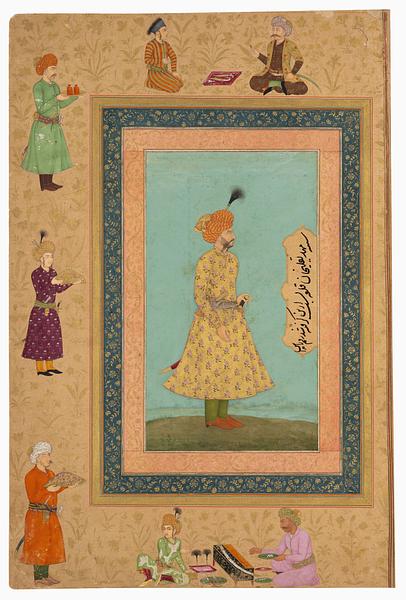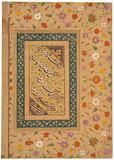Depicted in the centre of the miniature is the Persian officer Mahdi Quli Khan, whose forces were defeated by an Indian Mughal army in 1653. The officer surrendered and entered the service of the Mughal ruler Shah Jahan, and it is exactly this meeting between Persian and Indian courtly culture which is expressed in the painting.
Mahdi Quli Khan as well as four of the six surrounding courtiers sport long, bushy moustaches, while two are beardless and have long, curly sidelocks. Their headgear consists of either a large, rounded turban or, in one case, a flat fur hat. All these details reflect the Persian fashion of the time (see for example
154/2006). The men’s sabres are also of the slender Persian
shamshir type, while their daggers and several of the other small objects seen in the margin look Indian. This applies, for example, to two daggers with grips shaped like animal heads, which can be seen resting on small trays in the upper and lower margin, respectively (see
33/1979). It would be reasonable to imagine that these Indian effects were gifts or tokens of favour bestowed by the Mughal ruler.
The leaf was originally part of an album called the ‘Late Shah Jahan Album’, which contained more than a hundred portraits of important men in Shah Jahan’s service combined with older Persian calligraphy.
[1] The comment written in black on the right side of this miniature was added by Shah Jahan himself. In addition to stating the name of the person portrayed, it also identifies the creator of the painting as the artist Ram Das.
[2]On the reverse of the leaf is a piece of calligraphy done in the
nastaliq script on a background decorated with flowers. The calligraphy itself originates from sixteenth-century Central Asia and was done by the master calligrapher Mir Ali Haravi (d. 1544). His works were very popular at the Mughal court and would often be cut up and inserted into albums (see also 31/2001). The text, which consists of two verses by the Persian poet Jami (1411–1492), emphasises the wisdom of submitting to a stronger opponent rather than fighting in vain, precisely the course of action followed by Mahdi Quli Khan.


